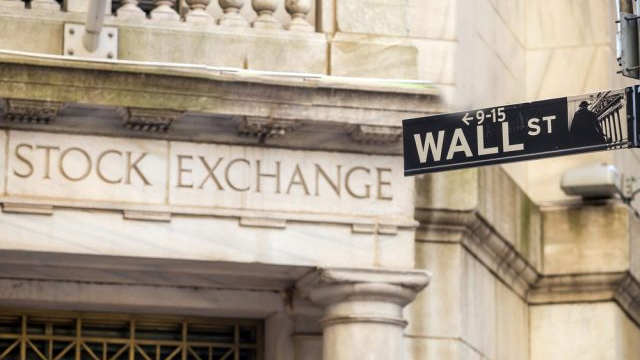Lately, every conversation I have with my friends ends up circling back to the same question:
What the HECK is going to happen to the economy?
We’ve seen mass layoffs in government agencies. Social programs on the chopping block. The Department of Education being gutted. Tariffs ramping up. Inflation stubbornly keeping everything expensive. Interest rates that might drop this year… or might not.
It’s a mess. And no one seems to have answers.
But here’s what I do know — having extra money to throw at problems makes uncertainty a whole lot easier to deal with.
I can’t tell you what the next six, 12, or 24 months are going to look like. But I can tell you what my family is doing to make sure we’re financially flexible enough to handle whatever comes next.
We don’t have a crystal ball. But we do have a plan.
And if you’re feeling that same creeping anxiety about what’s ahead, you can too.
How to Prepare for an Unpredictable Economy
You can’t control layoffs. You can’t control inflation. You definitely can’t control interest rates.
But you know what you can control? How much financial flexibility you have when things get messy.
Here’s what we’re doing to make sure we’re in the strongest position possible — and what you can do, too.
1) Stop Letting Your Cash Sit Idle
If your money is sitting in a basic checking account earning nothing, it’s losing value every day to inflation.
Instead, move it into a high-yield savings account (HYSA) that actually pays you interest. Right now, rates on HYSAs are around 4%-5%, which means your emergency fund or savings stash can grow passively.
This isn’t about taking risks with your savings — it’s about making sure your cash is actually working for you, even while it sits on the sidelines.
2) Pay Down High-Interest Debt Before It Becomes a Crisis
If you’re carrying credit card debt, now is the time to get aggressive about paying it down.
The average credit card interest rate is over 22%, which means your balance is growing fast if you’re not knocking it out. Even if the economy doesn’t get worse, getting rid of high-interest debt is one of the best financial moves you can make.
Not sure where to start?
Use the Avalanche Method (pay off the highest-interest debt first to save the most money). Or go with the Snowball Method (pay off the smallest balance first for motivation). If your credit is solid, consider a 0% balance transfer card to stop interest from piling up while you pay it down.
3) Look at Your Car Loan — Should You Pay Extra?
We’re taking a hard look at our car payment right now and considering whether it makes sense to pay extra toward the principal to free up future cash flow.
If rates don’t drop (or worse, go up), the last thing we want is to be stuck making payments longer than we have to. If we can throw some extra money at it now, we’ll have one less fixed expense to worry about later.
If you’re in a similar boat, run the numbers:
How much time is left on your loan?
How much would an extra $50-$100/month cut that down?
Could freeing up that money sooner give you more breathing room later?
4) Beef Up Your Emergency Fund
If things go south — a job loss, unexpected expenses, even just higher costs — you’ll want a fully loaded emergency fund.
If you don’t have at least three to six months of essential expenses saved up, now is the time to start stacking cash. Even adding a few extra hundred dollars a month can make a big difference over time.
And remember: Your emergency fund is meant to be used. There’s no prize for never touching it — its whole purpose is to keep you from going into debt when life throws you a curveball.
5) Max Out Any Free Money Available to You (Tax Credits & Deductions)
The IRS is not going to chase you down to make sure you’re claiming every tax credit or deduction you qualify for. That’s on you.
So before you file this year, double-check:
Are you claiming all deductions you qualify for?
If you have kids, are you getting every child tax credit you’re eligible for?
If you’re self-employed or have a side hustle, are you writing off every possible expense?
Leaving money on the table in tax season is like giving yourself a pay cut for no reason.
6) Keep Investing — Even When It’s Scary
The market has been volatile. Some days it’s up. Some days it’s ugly. And that’s exactly why sticking to your investing plan matters.
If you’ve got a long investing horizon (10+ years), the best thing you can do is keep putting money in regularly — whether it’s through your 401(k), IRA, or brokerage account.
Market downturns are not the time to stop investing. They’re the time to keep going so you’re buying at lower prices.
History has proven again and again: The people who stay invested through the chaos come out ahead.
7) Lock in Future Expenses (If It Makes Sense)
If you know you have big expenses coming in the next year or two — home repairs, car purchases, tuition — consider whether it makes sense to lock in today’s prices and rates instead of waiting.
For example:
If rates stay high, waiting to buy a car might not save you anything.
If inflation keeps climbing, delaying home repairs could make them even more expensive.
If you’re planning a big purchase and have the cash, securing a price now could be a win.
This one is case by case, but thinking ahead can keep you from getting squeezed later.
You Can’t Predict the Economy — But You Can Prepare for It
I have no idea what the economy will look like six months from now.
But I do know that having a strong financial foundation makes any scenario easier to deal with.
Whether the economy dips into a recession, keeps staggering forward, or somehow booms, these moves only make your financial position stronger.
So if you’ve been feeling that creeping anxiety about the future — this is your reminder that you don’t have to just hope for the best.
You can prepare for it.
Financial Market Newsflash
No financial news published today. Check back later.



